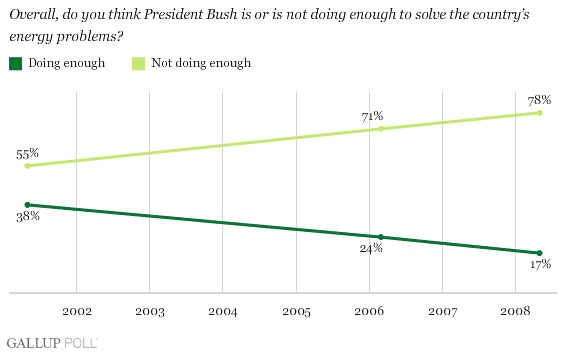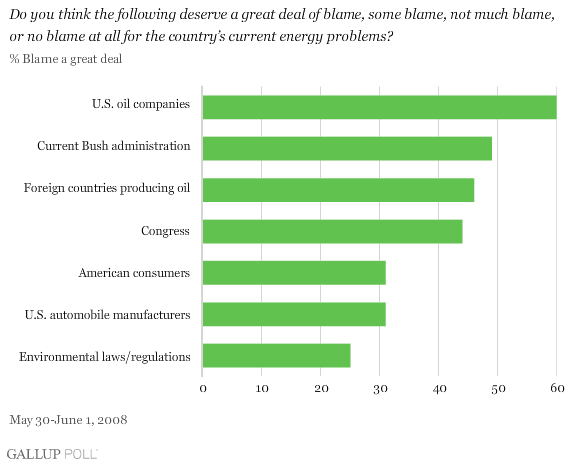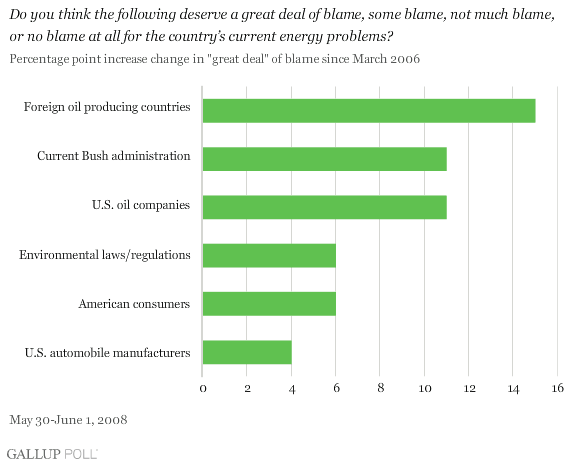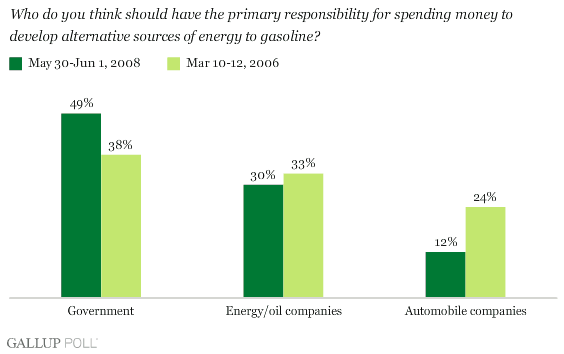PRINCETON, NJ -- In the midst of record high gas prices, just 17% of Americans say President Bush is doing enough to solve the country's energy problems, a significant decline from already low figures in 2006.

Additionally, nearly half of Americans, 49%, say the Bush administration deserves a great deal of blame for the country's energy problems, up from 38% in 2006 and just 20% in May 2001, when rolling blackouts in California focused national attention on the issue.
Of the seven government and business institutions tested in the poll, the Bush administration ranks second on the blame list, behind U.S. oil companies (60%). Oil companies have topped the list each time Gallup has asked the question, and -- like Bush -- are blamed more now than they were in 2006.

Even though these results find oil companies being blamed to a greater degree than in 2006, results of a recent Gallup Panel survey suggests that Americans are becoming more aware that high gas prices are a result of many factors beyond simple oil company greed. While "oil company greed" remains the most commonly mentioned reason for high gas prices, the percentage saying this has dropped significantly in the past year. Rather, Americans were more likely to cite a variety of other factors -- such as greater demand for oil, the declining value of the U.S. dollar, and market speculators -- as reasons for high gas prices.
This increase in blame for "big oil"from 49% to 60% may also reflect a more general pattern of the public assigning greater responsibility to all government and business institutions for the country's energy problems. All six institutions tested in the 2006 and 2008 Gallup Polls showed higher levels of blame this year.

Over the past two years, the public has increasingly looked to government to solve the nation's energy problems. Forty-nine percent of Americans now say the government should have the primary responsibility to develop alternative sources of energy to gasoline, up from 38% in 2006. Currently, 30% say oil and energy companies have the main responsibility, nearly the same as in 2006. Fewer now believe that automobile companies are largely responsible (12%) than did so in 2006 (24%).

Implications
The Bush administration and Congress have taken action on energy in recent years, but those steps were largely targeted toward energy usage in the future and did little to address the more immediate concern of high gas prices. Bush himself has said there is no "magic wand" he can wave to cut gas prices. Though Americans may be more aware of the complex reasons for high gas prices, they still hold their elected officials accountable. That may be why the already low approval ratings of Bush and Congress have eroded further in recent months.
Survey Methods
Results are based on telephone interviews with 1,012 national adults, aged 18 and older, conducted May 30-June 1, 2008. For results based on the total sample of national adults, one can say with 95% confidence that the maximum margin of sampling error is ±3 percentage points.
Interviews are conducted with respondents on land-line telephones (for respondents with a land-line telephone) and cellular phones (for respondents who are cell-phone only).
In addition to sampling error, question wording and practical difficulties in conducting surveys can introduce error or bias into the findings of public opinion polls.
To provide feedback or suggestions about how to improve Gallup.com, please e-mail feedback@gallup.com.
